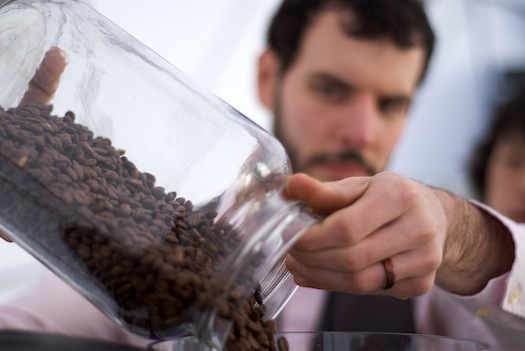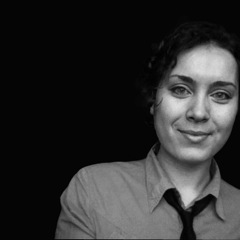
Pouring beans at 2011 TED Conference coffee bar. Photo: Brian W. Jones
If mid-century America was characterized by the glorification of consumerism's factory-made bastions, the past decade has swiveled into the polar opposite, with its cult of the handmade and of artisanal goods – a groundswell most eloquently described by Adam Sachs as "the Oregon-ization of America." Whether elevated into an art form, reviled as frivolous fetishism, or held as a higher moral standard alongside the movement's implicit undertones of local, sustainable and fair-trade, one thing is certain: the cult of craftsmanship has seeped into nearly every corner of consumer culture, with varying degrees of authenticity. Somewhere between Crate & Barrell's faux-handmade door mats, Etsy's indie inventory and a $90 letterpress poster of San Francisco bikes lies the heart of a cultural ethos built on the premise of individualism yet plowing through the mainstream with ever-increasing velocity.
Now, an ambitious collective is bringing this same ethos to the world's most beloved beverage. Coffee Common, a new coalition of coffee roasters and farmers affiliated with Alex Bogusky's COMMON project, aims to fight coffee culture's legacy of commodification through education and elevation, powering a new paradigm in which people treat coffee like produce.
At last month's TED conference, where Coffee Common made its official debut, we sat down with Brian W. Jones, one of the project's seven co-founders, to talk about the organization's vision, the mythologies of coffee and the importance of curiosity in tastemaking.
Maria Popova: The past few years have seen a groundswell of premium organic, local and fair-trade food, but this hasn't necessarily been the case for beverages. What is Coffee Common doing differently to bring this ethos to coffee, or is it a different culture altogether?
Brian W. Jones: It often seems to be a different culture, but it shouldn’t be. We’re pushing back against a decades-old tradition of really cheap coffee as a birthright. People want bottomless cups for a dollar without really understanding where that coffee came from and the process involved to get it in their cup. We believe that consumer awareness though direct conversation and public experiences can help spread the information we want to share. It’s hard to just tell someone why great coffee should be valued; it works best when we can show them.
Popova: What are some of the mythologies and mainstream conventions about coffee – its farming, its roasting, its consumption – that you're trying to counter?
Jones: Most importantly that coffee be regarded as a produce. Coffee has an expiration date and goes stale pretty rapidly after it’s roasted. Once more consumers understand that coffee shouldn’t be stored in their freezer like a bag of corn; it opens up the conversation to everything else. This understanding will create curiosity about the origin, the farm, and why a coffee from Ethiopia tastes different than a coffee from Colombia. When roasted properly, the terroir of specific regions and even farms are accentuated instead of being masked by the carbon taste of over-roasted beans. This also leads to a sweeter drink with less bitterness that doesn’t require cream and sugar.
Popova: As you focus on fair trade and sustainable agricultural models, what are some of the most notable innovations in those areas you've seen in farmers and roasters you work with?
Jones: Some of the most innovative processes are the ones that let Mother Nature do her work. There is a correlation between not over-taxing the land and high-quality coffee. Simply facilitating this natural growth, while gently managing it can lead to fantastic coffee, but with much lower yields. Things we consider sustainable, like water-saving techniques and recycled packaging, aren’t necessarily innovative, but required in the developing world.
Popova: What is Coffee Common's business model?
Jones: We don’t have one. Yet. Our committee is made up of seven people representing many aspects of the coffee industry around the world. We have continued working together virtually, planning our next steps, but we all have day jobs that needed to be tended to after TED ended. We understand that moving forward we can’t continue to rely on sponsorships and are weighing all of our options for future events. There is a lot of business experience on our committee as well as having access to all of the resources at COMMON, so I’m confident we’ll figure it out.


Comments [1]
04.13.11
12:39